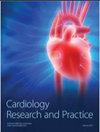Comparative Analysis of Hypertension Guidelines: Unveiling Consensus and Discrepancies in Lifestyle Modifications for Blood Pressure Control
IF 1.8
4区 医学
Q3 CARDIAC & CARDIOVASCULAR SYSTEMS
引用次数: 0
Abstract
Background. Hypertension is a major global health concern, and lifestyle modifications have been recommended as first-line treatment for hypertension in many guidelines. However, different guidelines may recommend different types of lifestyle adjustment, and it is unclear which ones are most effective. In this review, we compared hypertension guidelines to identify any differences and/or consensus in content, efficacy, and timing of initiation of lifestyle modifications. Methods. We conducted a search of databases to identify hypertension guidelines available in English. We extracted and compared information about lifestyle modifications recommended by the guidelines. Results. Five hypertension guidelines from America, Europe, the UK, Canada, and the International Society of Hypertension are included. They all recommend diet adaptation, sodium reduction, alcohol restriction, physical exercise, and weight reduction. Other lifestyle interventions emphasized by some guidelines, such as potassium supplementation, smoking cessation, and stress management, are not recommended by all the five guidelines. Among lifestyle changes, the dietary approaches to stop hypertension (DASH) diet may be considered the most effective treatment for reducing blood pressure. These guidelines recommend that for patients with high-normal blood pressure or grade 1 hypertension without high risk factors, lifestyle medicine should be used first for 3–6 months, if blood pressure is still not controlled, then start medication. For those patients who need drug treatment, lifestyle changes can also enhance the effects of antihypertensive therapy. Conclusion. Lifestyle modifications are crucial in the treatment of hypertension and should be recommended to most hypertensive patients. Among these lifestyle interventions, diet adaptation containing low sodium and alcohol restriction may be the most effective in reducing blood pressure. Physical exercise and weight reduction are also recommended. In some cases, lifestyle modifications should be tried first. They may also enhance the effects of antihypertensive drugs in other patients.高血压指南比较分析:揭示控制血压的生活方式调整方面的共识与分歧
背景。高血压是全球关注的主要健康问题,许多指南都建议将调整生活方式作为高血压的一线治疗方法。然而,不同的指南可能推荐不同类型的生活方式调整,目前尚不清楚哪种生活方式调整最有效。在本综述中,我们对高血压指南进行了比较,以确定在生活方式调整的内容、疗效和启动时机方面的差异和/或共识。方法。我们对数据库进行了检索,以确定现有的英文高血压指南。我们提取并比较了指南推荐的生活方式调整信息。结果。共收录了来自美国、欧洲、英国、加拿大和国际高血压学会的五份高血压指南。它们都建议调整饮食、减少钠盐摄入、限制饮酒、体育锻炼和减轻体重。一些指南强调的其他生活方式干预措施,如补充钾、戒烟和压力管理,并不是所有五份指南都推荐的。在改变生活方式的方法中,高血压饮食疗法(DASH)可能被认为是降低血压最有效的治疗方法。这些指南建议,对于血压正常或一级高血压且无高危因素的患者,应首先使用生活方式药物治疗 3-6 个月,如果血压仍未得到控制,再开始药物治疗。对于需要药物治疗的患者,改变生活方式也能增强降压治疗的效果。结论改变生活方式是治疗高血压的关键,应推荐给大多数高血压患者。在这些生活方式干预措施中,低钠饮食和限制饮酒可能对降低血压最有效。此外,还建议进行体育锻炼和减轻体重。在某些情况下,应首先尝试改变生活方式。对其他患者来说,这些措施也可能会增强降压药物的效果。
本文章由计算机程序翻译,如有差异,请以英文原文为准。
求助全文
约1分钟内获得全文
求助全文
来源期刊

Cardiology Research and Practice
Medicine-Cardiology and Cardiovascular Medicine
CiteScore
4.40
自引率
0.00%
发文量
64
审稿时长
13 weeks
期刊介绍:
Cardiology Research and Practice is a peer-reviewed, Open Access journal that publishes original research articles, review articles, and clinical studies that focus on the diagnosis and treatment of cardiovascular disease. The journal welcomes submissions related to systemic hypertension, arrhythmia, congestive heart failure, valvular heart disease, vascular disease, congenital heart disease, and cardiomyopathy.
 求助内容:
求助内容: 应助结果提醒方式:
应助结果提醒方式:


